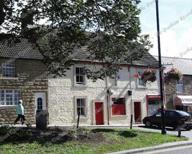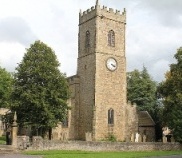
Lanchester Local History Society



by John Clifford January 2022.
Susan Clifford was born near Derby and should have grown up there with her siblings and cousins, but she did not. Her mother died after giving birth to her. Susan's father already had four children, and entrusted her to close friends who had none of their own, coal miner John Varley and his wife, Harriet.
At some time in the 1890s, the Varleys moved with Susan 150 miles north to County Durham. They lived on Hamsteels Common, one of several coal mining communities just south of Lanchester. John probably worked at Cornsay Colliery for about 10 years. Many families had been attracted to the Durham coalfield where mine owners offered free but poor-quality housing. Hard living and working environments created the conditions for excessive drinking, gambling and violence. Expansion of social facilities and new Methodist churches were successful to some degree in exerting a wholesome influence. John may have known personally several of the miners who died in accidents.
The family then moved to Jarrow where conditions were similar. Susan became pregnant at 21 and her son was born in December 1909. His father was a Palmers shipyard worker of mixed race. Susan got married in South Shields in 1911, and had a daughter in 1913. Despite the distance, it seems that Susan was able to maintain contact with her family in Derby.
By the 1920s, Palmers' business was struggling. The family decided to move 285 miles south to the borough of Poplar with its docks in London’s East End. This was the era of the General Strike of 1926, the Great Depression and the Jarrow March to London of 1936 that followed closure of the shipyard. Susan’s son and daughter started their own families. But Susan would not live to enjoy her grandchildren as she died in 1938 aged 50.
Susan was a cousin of the author's great grandfather.
To read the full, richly illustrated story click to download the article in pdf format
The Lost Sister: Susan Clifford (1888-1938) and her family in Derbyshire, County Durham and London. (9960k) John Clifford January 2022.
by Pat Conibere, April 2010.
Email received 17 Oct 2020 from Pat Conibere.
Dear Marian
I’ve attached an account of the Lanchester Colliery which I researched and wrote ten years ago. Tracing this story initiated an intense period of family history research which only came to an end (more or less!) when I’d traced every possible line of my family history and unearthed some wonderful stories. It’s the stories, rather than a series of dates, which bring your ancestors to life and open up fascinating areas of social and industrial history. I can still remember the thrill of finding my ancestor, John Dormand, described in a census record as a coal owner. He’d become a viewer when I found him in the previous census, and at first I felt great disappointment as I’d misread “owner” as “miner”. I had begun to think that the family story of a 2x great grandfather who owned a coalmine in Lanchester was a myth.
For some time I’ve wondered if there might be anyone who would be interested in this account, and possibly someone who could add something to the story or question any of my conclusions. The Lanchester Local History Society would appear to be a good starting point. I hope you and some of your members find this of interest. I’d be very pleased to hear from anyone who would like to comment or tell me more about the people and events connected to this aspect of Lanchester’s history.
Kind regards Pat Conibere (for contact details download the article)
Click to download the article in pdf format
John Dormand (1813-1890) and the Lanchester Colliery.(999k) Pat Conibere April 2010.
The group was formed in the spring of 1969 by Wally Austin, Alan Reed, Keith Proud and John Gall. It was originally called The Lanchester Society of Antiquarians, later changing its name to Lanchester Local History Society and even later to Lanchester History Society.
Its early meetings were held in the atmospheric front room of Upper Houses Farm, dating from the 1650s, with refreshments provided by Wally’s wife Cissy. The reason for the Society’s creation was to share the work the group had produced in the Lanchester Parish and in particular to press for the preservation of the Roman Fort of Longovicium and the surrounding landscape, which was threatened by opencast coalmining proposals.
Alan Reed had contacts with Durham University and the Newcastle Society of Antiquarians, and staff from both of these organisations were regular speakers and supporters of the Society. Wally had acquired some early Transactions of the Newcastle Society, which included articles on the Parish by John Hodgson, leading to many years of interest in the Roman aqueducts and the heaps of iron scoria or slag, which dotted the western areas of the Parish. Professor Birley kindly loaned his own copy of Hodgson’s Poems, which included many references to the area for copying and sharing.
The Society developed an interest in J.W.Fawcett, who although he was based in Satley, did a vast amount of work on the Parish and its families. The Society also received great assistance from Canon Beckwith and later Canon Chase, both of whom had great interest in the Parish Church and its records. I can still remember the excitement when the recently discovered Tithe maps were unrolled for the members, after being found in an old tin tube in the vestry cupboard in 1971.
The Society continued to meet at Upper Houses Farm until the membership grew to around 30, when it was felt to be too much for the kind hospitality of Wally and Cissy, and it was with much regret that the Society moved its meetings down to St Bedes and eventually to the Community Centre. Although this allowed more room for meeting, the farmhouse with its supply of coffee, Schein’s wine and whisky to aid discussions far into the night, were much missed!
As time moved forward, members were lost and it was realised that we were losing considerable local knowledge, and it became important to publish transactions. This was done for a number of years under editors Jack Clifford and one of the earliest members, Kevin Leary. These were aimed at preserving local Parish history together with memories of the Village for future generations.
John Gall, with help from Kevin Leary and Cissy Austin. 2020 Lanchester Local History Society.
January 2020 is an appropriate time to make the journals available for all as buried history is lost history.
Hosted by DurhamWeb.